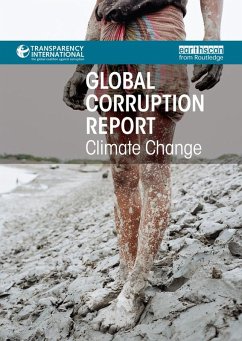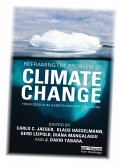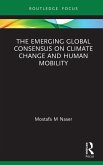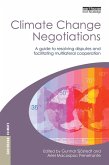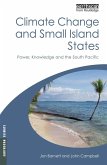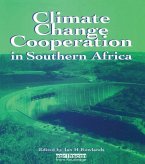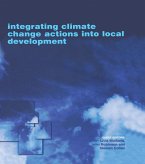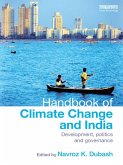Global Corruption Report: Climate Change (eBook, ePUB)
Redaktion: International, Transparency


Alle Infos zum eBook verschenken

Global Corruption Report: Climate Change (eBook, ePUB)
Redaktion: International, Transparency
- Format: ePub
- Merkliste
- Auf die Merkliste
- Bewerten Bewerten
- Teilen
- Produkt teilen
- Produkterinnerung
- Produkterinnerung

Hier können Sie sich einloggen

Bitte loggen Sie sich zunächst in Ihr Kundenkonto ein oder registrieren Sie sich bei bücher.de, um das eBook-Abo tolino select nutzen zu können.
The global response to climate change will demand unprecedented international cooperation, deep economic transformation and resource transfers at a significant scale. Corruption threatens to jeopardise these efforts.
Transparency International's Global Corruption Report: Climate Change is the first publication to comprehensively explore such corruption risks. More than fifty leading experts and practitioners contribute, covering four key areas:
governance: investigating major governance challenges towards tackling climate change | mitigating climate change: reducing greenhouse gas…mehr
- Geräte: eReader
- mit Kopierschutz
- eBook Hilfe
- Größe: 8.93MB
![Reframing the Problem of Climate Change (eBook, ePUB) Reframing the Problem of Climate Change (eBook, ePUB)]() Klaus HasselmannReframing the Problem of Climate Change (eBook, ePUB)56,95 €
Klaus HasselmannReframing the Problem of Climate Change (eBook, ePUB)56,95 €![The Emerging Global Consensus on Climate Change and Human Mobility (eBook, ePUB) The Emerging Global Consensus on Climate Change and Human Mobility (eBook, ePUB)]() Mostafa M NaserThe Emerging Global Consensus on Climate Change and Human Mobility (eBook, ePUB)21,95 €
Mostafa M NaserThe Emerging Global Consensus on Climate Change and Human Mobility (eBook, ePUB)21,95 €![Climate Change Negotiations (eBook, ePUB) Climate Change Negotiations (eBook, ePUB)]() Climate Change Negotiations (eBook, ePUB)45,95 €
Climate Change Negotiations (eBook, ePUB)45,95 €![Climate Change and Small Island States (eBook, ePUB) Climate Change and Small Island States (eBook, ePUB)]() Jon BarnettClimate Change and Small Island States (eBook, ePUB)48,95 €
Jon BarnettClimate Change and Small Island States (eBook, ePUB)48,95 €![Climate Change Cooperation in Southern Africa (eBook, ePUB) Climate Change Cooperation in Southern Africa (eBook, ePUB)]() Climate Change Cooperation in Southern Africa (eBook, ePUB)29,95 €
Climate Change Cooperation in Southern Africa (eBook, ePUB)29,95 €![Integrating Climate Change Actions into Local Development (eBook, ePUB) Integrating Climate Change Actions into Local Development (eBook, ePUB)]() Integrating Climate Change Actions into Local Development (eBook, ePUB)29,95 €
Integrating Climate Change Actions into Local Development (eBook, ePUB)29,95 €![Handbook of Climate Change and India (eBook, ePUB) Handbook of Climate Change and India (eBook, ePUB)]() Handbook of Climate Change and India (eBook, ePUB)60,95 €
Handbook of Climate Change and India (eBook, ePUB)60,95 €-
-
-
Transparency International's Global Corruption Report: Climate Change is the first publication to comprehensively explore such corruption risks. More than fifty leading experts and practitioners contribute, covering four key areas:
- governance: investigating major governance challenges towards tackling climate change
- mitigating climate change: reducing greenhouse gas emissions with transparency and accountability
- adapting to climate change: identifying corruption risks in climate-proofing development, financing and implementation of adaptation
- forestry governance: responding to the corruption challenges plaguing the forestry sector, and how these challenges need to be integrated into current international strategies to halt deforestation and promote reforestation.
The Global Corruption Report: Climate Change provides essential policy analysis to help policy-makers, practitioners and other stakeholders understand these risks and develop effective responses at a critical point in time when the main architecture for climate governance is being developed.
Dieser Download kann aus rechtlichen Gründen nur mit Rechnungsadresse in A, B, BG, CY, CZ, D, DK, EW, E, FIN, F, GR, HR, H, IRL, I, LT, L, LR, M, NL, PL, P, R, S, SLO, SK ausgeliefert werden.
- Produktdetails
- Verlag: Taylor & Francis eBooks
- Seitenzahl: 400
- Erscheinungstermin: 26. November 2013
- Englisch
- ISBN-13: 9781317972198
- Artikelnr.: 40106710
- Verlag: Taylor & Francis eBooks
- Seitenzahl: 400
- Erscheinungstermin: 26. November 2013
- Englisch
- ISBN-13: 9781317972198
- Artikelnr.: 40106710
- Herstellerkennzeichnung Die Herstellerinformationen sind derzeit nicht verfügbar.
1.0. Defining the Challenge: Threats to Effective Climate Governance 1.1.
Mapping the Climate Change and Governance Challenge: The Big Picture 2.
The Climate Policy Framework: Examining the Effectiveness and
Accountability of Current Processes 2.0. The Climate Policy Framework:
Examining the Effectiveness and Accountability of Current Processes
2.1. From Global Power Politics to Responsible Collective Governance: The
Transparency and Inclusiveness of International Climate Governance
Institutions and Processes 2.2. Essential Building Blocs for Kyoto and
Beyond: Agreeing on Climate Commitments at National and Regional Level
2.2.1. For Europe: Equal Access, Unequal Voice: Business and NGO Lobbying
on EU Climate Policy 2.2.2. For US: US Climate Policies: A Snapshot of
Lobbyist Influence 2.3. Urban Governance and Climate Change Policy 2.4.
Vested or Public Interest? The Matrix of Interests and Influence in Key
Emerging Climate Countries 2.4.1. India 2.4.2. Climate Policies in China:
a Gradual Move Towards Ambition, More Transparency and Nascent Citizen
Involvement 2.5. Climate Policies in Austria: Poor Accountability Breeds
Slow Progress 3. Key Elements to Building Integrity in Decision-making
3.0. Key Elements to Building Integrity in Decision-making 3.1. Climate
Science: The World is its Jury 3.2. Making Climate Governance Accountable:
Reflections on what can be Learned from International Environmental
Governance 3.3. The Aarhus Convention: A Blueprint for Inclusive and
Accountable Climate Governance? 3.4. Civil Society and the Climate Change
Process: How does Participation Compare as a Measure of Transparency? 3.5.
Holding Commitment to Account: The Governance Dimension in Climate Change
Measurement 3.6. Personal View: A Fresh Approach to Climate Politics? 4.
Ensuring Integrity and Transparency in Climate Change Mitigation 4.0.
Ensuring Integrity and Transparency in Climate Change Mitigation 4.1.
Greenhouse Gas Accounting: a Foundation for Sound Climate Governance 4.2.
Measuring, Reporting and Verification of NAMAs and their Support:
Considering Capacity, Corruption and Commitments 4.3. The Trade-offs of
Trade: Realities and Risks of Carbon Markets 4.3.1 Slovak Public See No
Credit in Government's Carbon Trading 4.3.2. Permit Politics: Hungary's
CO2 Allowances 4.3.3. Shortcomings and Shortcuts: Sri Lanka's
Environmental Impact Assessments 4.3.4. Voluntary Carbon Markets:
Successes and Shortfalls 4.3.5. Sectoral Crediting: Getting Governance
Right from the Beginning 4.4. Climate Change: Corporate Change: Shifting
Business Models to Towards the Climate Agenda 4.5. Policy Engagement: A
Missing Link in Corporate Climate Reporting 4.5.1. Colombia: Measuring
Transparency Policies and Mechanisms in Public Utilities 4.6. Enabling
Green Choices: Ensuring Consumers Receive Accurate, Actionable Information
on the Climate Impacts of their Consumption Choices 4.7. Could Corruption
Pose a Barrier to Roll-out of Renewable Energy in North Africa? 4.7.1.
Spain: Can Incentivising Solar Energy Invite Fraud? 4.8. Preventing a
Resource Curse Fuelled by the Green Economy 4.8.1. Bolivia's Lithium:
Opportunities and Challenges 4.9. Engineering the Earth: Considering
Accountability and the Last Resort 5. Adaptation to Climate Change:
Building Accountable, Sustainable Resilience 5.0. Adaptation to Climate
Change: Building Accountable Sustainable Resilience 5.1. Show me the
Money: Ensuring Equity, Transparency and Accountability in Adaptation
Finance 5.1.1. Fast-start Funding: is There an Emerging Parallel Structure
for Climate Finance? 5.1.2. Climate Change Funds and Development: How to
Ensure Transparency and Access to Information on Funding Streams for
Adaptation 5.2. Promoting an Effective and Transparent Use of Funds
through the Adaptation Fund 5.3. Climate-proofing Development: Corruption
Risks in Adaptation Infrastructure 5.3.1. Climate Change, Infrastructure
and Corruption 5.3.2. Climate-proofing and Political Influence in the
Philippines 5.4. Disrupting Lives: Climate Migration and Corruption 5.4.1
The Plunder of Kenya's Forests: Resettling the Settlers and Holding the
Loggers Accountable 5.4.2. Climate Change Adaptation and Water
Integrity: A Global Challenge to Address Local Realities 5.5. When
Disaster Strikes: Corruption and Rapid Response in Climate-related Relief
and Recovery 6. Forestry Governance: A Key Issue for Climate Change 6.1.
Corruption: A Root Cause of Deforestation and Forest Degradation 6.1.1.
Climate Change and Corruption Leave the World's Largest Mangrove Forest in
Peril 6.2. Governance in the World's Tropical Forests: Where Will REDD+
Land? 6.2.1. Bosaw's: The 'Lung of Central America' Under Threat 6.3.
Governance Risks for REDD+: How Weak Forest Carbon Accounting can Create
Opportunities for Corruption and Fraud 6.3.1. Hypothetical Offsets - Real
Corruption? Carbon Offsets in Papua New Guinea 6.3.2. Is Norway Rocking
the REDD Boat?
1.0. Defining the Challenge: Threats to Effective Climate Governance 1.1.
Mapping the Climate Change and Governance Challenge: The Big Picture 2.
The Climate Policy Framework: Examining the Effectiveness and
Accountability of Current Processes 2.0. The Climate Policy Framework:
Examining the Effectiveness and Accountability of Current Processes
2.1. From Global Power Politics to Responsible Collective Governance: The
Transparency and Inclusiveness of International Climate Governance
Institutions and Processes 2.2. Essential Building Blocs for Kyoto and
Beyond: Agreeing on Climate Commitments at National and Regional Level
2.2.1. For Europe: Equal Access, Unequal Voice: Business and NGO Lobbying
on EU Climate Policy 2.2.2. For US: US Climate Policies: A Snapshot of
Lobbyist Influence 2.3. Urban Governance and Climate Change Policy 2.4.
Vested or Public Interest? The Matrix of Interests and Influence in Key
Emerging Climate Countries 2.4.1. India 2.4.2. Climate Policies in China:
a Gradual Move Towards Ambition, More Transparency and Nascent Citizen
Involvement 2.5. Climate Policies in Austria: Poor Accountability Breeds
Slow Progress 3. Key Elements to Building Integrity in Decision-making
3.0. Key Elements to Building Integrity in Decision-making 3.1. Climate
Science: The World is its Jury 3.2. Making Climate Governance Accountable:
Reflections on what can be Learned from International Environmental
Governance 3.3. The Aarhus Convention: A Blueprint for Inclusive and
Accountable Climate Governance? 3.4. Civil Society and the Climate Change
Process: How does Participation Compare as a Measure of Transparency? 3.5.
Holding Commitment to Account: The Governance Dimension in Climate Change
Measurement 3.6. Personal View: A Fresh Approach to Climate Politics? 4.
Ensuring Integrity and Transparency in Climate Change Mitigation 4.0.
Ensuring Integrity and Transparency in Climate Change Mitigation 4.1.
Greenhouse Gas Accounting: a Foundation for Sound Climate Governance 4.2.
Measuring, Reporting and Verification of NAMAs and their Support:
Considering Capacity, Corruption and Commitments 4.3. The Trade-offs of
Trade: Realities and Risks of Carbon Markets 4.3.1 Slovak Public See No
Credit in Government's Carbon Trading 4.3.2. Permit Politics: Hungary's
CO2 Allowances 4.3.3. Shortcomings and Shortcuts: Sri Lanka's
Environmental Impact Assessments 4.3.4. Voluntary Carbon Markets:
Successes and Shortfalls 4.3.5. Sectoral Crediting: Getting Governance
Right from the Beginning 4.4. Climate Change: Corporate Change: Shifting
Business Models to Towards the Climate Agenda 4.5. Policy Engagement: A
Missing Link in Corporate Climate Reporting 4.5.1. Colombia: Measuring
Transparency Policies and Mechanisms in Public Utilities 4.6. Enabling
Green Choices: Ensuring Consumers Receive Accurate, Actionable Information
on the Climate Impacts of their Consumption Choices 4.7. Could Corruption
Pose a Barrier to Roll-out of Renewable Energy in North Africa? 4.7.1.
Spain: Can Incentivising Solar Energy Invite Fraud? 4.8. Preventing a
Resource Curse Fuelled by the Green Economy 4.8.1. Bolivia's Lithium:
Opportunities and Challenges 4.9. Engineering the Earth: Considering
Accountability and the Last Resort 5. Adaptation to Climate Change:
Building Accountable, Sustainable Resilience 5.0. Adaptation to Climate
Change: Building Accountable Sustainable Resilience 5.1. Show me the
Money: Ensuring Equity, Transparency and Accountability in Adaptation
Finance 5.1.1. Fast-start Funding: is There an Emerging Parallel Structure
for Climate Finance? 5.1.2. Climate Change Funds and Development: How to
Ensure Transparency and Access to Information on Funding Streams for
Adaptation 5.2. Promoting an Effective and Transparent Use of Funds
through the Adaptation Fund 5.3. Climate-proofing Development: Corruption
Risks in Adaptation Infrastructure 5.3.1. Climate Change, Infrastructure
and Corruption 5.3.2. Climate-proofing and Political Influence in the
Philippines 5.4. Disrupting Lives: Climate Migration and Corruption 5.4.1
The Plunder of Kenya's Forests: Resettling the Settlers and Holding the
Loggers Accountable 5.4.2. Climate Change Adaptation and Water
Integrity: A Global Challenge to Address Local Realities 5.5. When
Disaster Strikes: Corruption and Rapid Response in Climate-related Relief
and Recovery 6. Forestry Governance: A Key Issue for Climate Change 6.1.
Corruption: A Root Cause of Deforestation and Forest Degradation 6.1.1.
Climate Change and Corruption Leave the World's Largest Mangrove Forest in
Peril 6.2. Governance in the World's Tropical Forests: Where Will REDD+
Land? 6.2.1. Bosaw's: The 'Lung of Central America' Under Threat 6.3.
Governance Risks for REDD+: How Weak Forest Carbon Accounting can Create
Opportunities for Corruption and Fraud 6.3.1. Hypothetical Offsets - Real
Corruption? Carbon Offsets in Papua New Guinea 6.3.2. Is Norway Rocking
the REDD Boat?
